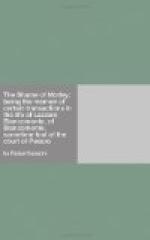All night I rode despite that weather’s foulness—a foulness that might have given pause to one whose haste to bear a letter was less attuned to his own supreme desires.
Betimes next morning I paused at a small locanda on the road to Magliano, and there I broke my fast and took some rest. My horse had suffered by the journey more than had I, and I would have taken a fresh one at Magliano, but there was none to be had—so they told me—this side of Narni, wherefore I was forced to set out once more upon that poor jaded beast that had carried me all night.
It was high noon when I came, at last, to Narni, the last league of the journey accomplished at a walk, for my nag could go no faster. Here I paused to dine, but here, again, they told me that no horses might be had. And so, leading by the bridle the animal I dared no longer ride, lest I should kill it outright, I entered the territory of Urbino on foot, and trudged wearily amain through the snow that was some inches deep by now. In this miserable fashion I covered the seven leagues, or so, to Spoleto, where I arrived exhausted as night was falling.
There, at the Osteria del Sole, I supped and lay. I found a company of gentlemen in the common-room, who upon espying my motley—when I had thrown off my sodden cloak and hat—pressed me, willy-nilly, into amusing them. And so I spent the night at my Fool’s trade, giving them drolleries from the works of Boccacci and Sacchetti—the horn-books of all jesters.
I obtained a fresh horse next morning, and I set out betimes, intending to travel with a better speed. The snow was thick and soft at first, but as I approached the hills it grew more crisp. Overhead the sky was of an unbroken blue, and for all that the air was sharp there was warmth in the sunshine. All day I rode hard, and never rested until towards nightfall I found myself on the spurs of the Apennines in the neighborhood of Gualdo, the better half of my journey well-accomplished. The weather had changed again at sunset. It was snowing anew, and the north wind was howling like a choir of the damned.
Before me gleamed the lights of a little wayside tavern, and since it might suit me better to lie there than to journey on to Gualdo, I drew rein before that humble door, and got down from my wearied horse. Despite the early hour the door was already barred, for the bedding of travellers formed no part of the traffic of so lowly a house as this nameless, wayside wine-shop. Theirs was a trade that ended with the daylight. Nevertheless I was assured they could be made to find me a rag of straw to lie on, and so I knocked boldly with my whip.
The taverner who opened for me, and stood a moment surveying me by the light of the torch he held aloft, was a slim, mild-mannered man, not over-clean. Behind him surged the figure of his wife; just such a woman as you might look to find the mate of such a man: broad and tall of frame and most scurvily cross-grained of face. It may well be that had he bidden me welcome, she had driven me back into the night; but since he made some demur when I asked for lodging, and protested that in his house was but accommodation too rude to offer my magnificence, the woman thrust him aside, and loudly bade me enter.




